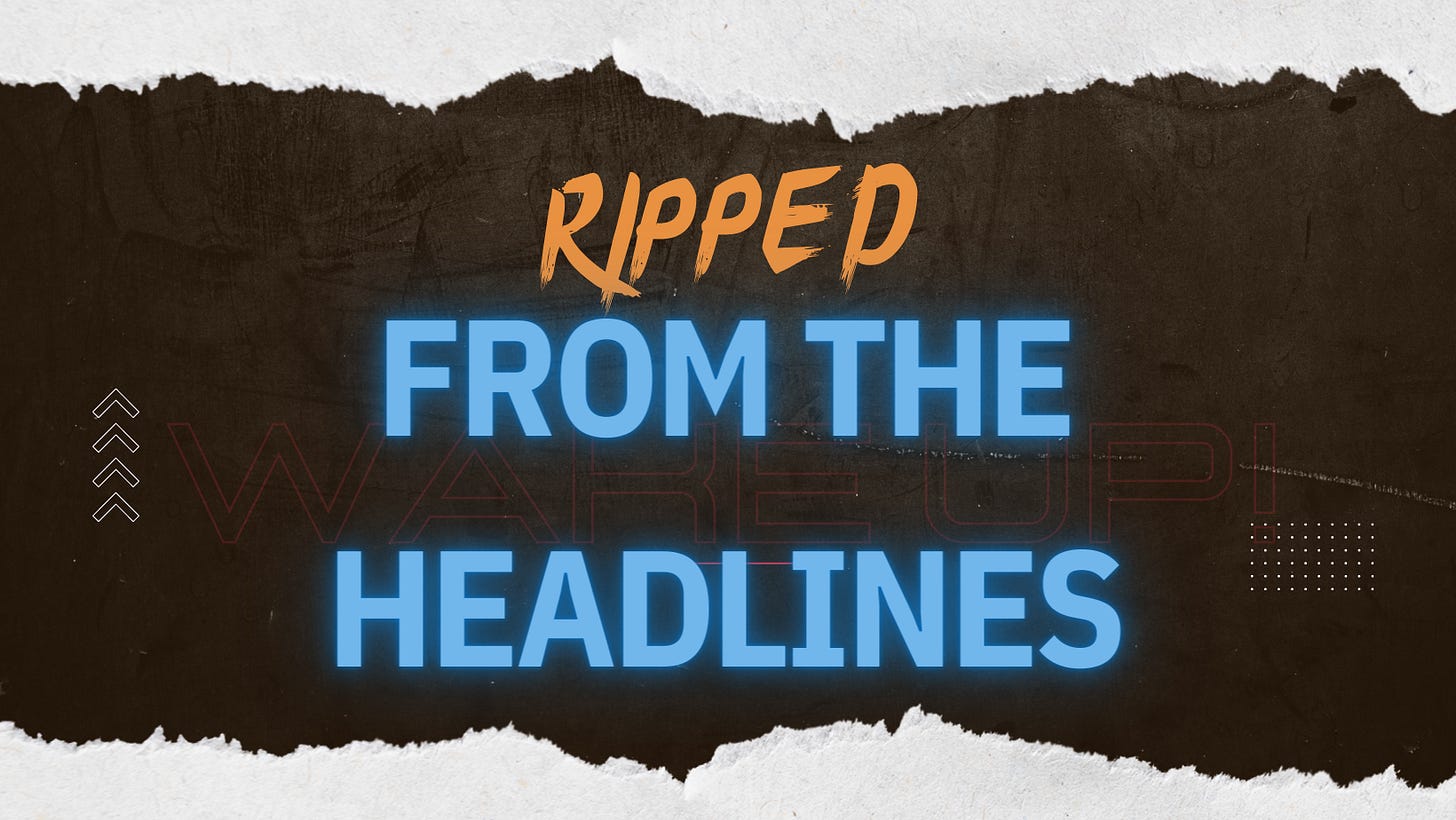Ripped From The Headlines, March 24, 2023
Banks Keep Taking Fed Money, Moody's: Greater Financial Damage Than Anticipated, Deutsche Bank On The Brink - Read, Share, & Subscribe - SherlocExposes.com
We Are The Watchmen On The Wall
Please support our sponsor, Satellite Phone Store!
Next-level preparation is necessary...
The potential for blackouts, cell phone service outages… it’s real.
How will you communicate?
Objects being shot down, train derailments, bank runs, infrastructure issues…
How long could people be without communication? What could be lost?
Satellite Phone Store has phones, radios, alternative power, and much more.
Visit them today - YOUR FUTURE DEPENDS ON IT.
(EDITOR’S NOTE: Orange-linked text is clickable for additional information.)
“Banks reduced their borrowings only slightly from two Federal Reserve backstop facilities in the most recent week, a sign that institutions are taking advantage of the central bank’s liquidity in the wake of turmoil.
US institutions had a combined $163.9 billion in outstanding borrowings in the week through March 22, compared with $164.8 billion the previous week, according to Fed data Thursday.
Data showed $110.2 billion in borrowing from the Fed’s traditional backstop lending program known as the discount window compared with a record $152.9 billion in outstanding credit the previous week. The loans can be extended for up to 90 days and the window accepts a broad range of collateral.
Outstanding borrowings from the Bank Term Funding Program stood at $53.7 billion, compared with $11.9 billion the previous week. The BTFP was opened March 12 after the Fed declared emergency conditions following the collapse of California’s Silicon Valley Bank and New York’s Signature Bank.
Fed loans to bridge banks established by the Federal Deposit Insurance Corp. to resolve SVB and Signature Bank rose to $179.8 billion from $142.8 billion the previous week.
‘There’s nothing here, which suggests things aren’t spreading,’ said Blake Gwin, head of US interest rates strategy at RBC Capital Markets.”
“Despite quick action by regulators and policy makers, there’s a rising risk that banking-system stress will spill over into other sectors and the U.S. economy, ‘unleashing greater financial and economic damage than we anticipated,’ said Moody’s Investors Service, one of the Big Three credit-ratings firms.
Simply put, the risk is that officials ‘will be unable to curtail the current turmoil without longer-lasting and potentially severe repercussions within and beyond the banking sector,’ Atsi Sheth, Moody’s managing director of credit strategy, and others wrote in a note distributed on Thursday. Still, the agency’s baseline view is that U.S. officials will ‘broadly succeed.’
Moody’s warning came as Treasury Secretary Janet Yellen indicated that the U.S. could take additional actions if needed to stabilize the banking system, and after Federal Reserve Chairman Jerome Powell assured Americans on Wednesday that the central bank would use its tools to protect depositors.”
“Investors sparked a selloff in Deutsche Bank AG DB and thrust one of Europe’s most important lenders into the center of concerns about the health of the global financial system.
Shares of Germany’s largest lender tumbled as much as 15%, their third consecutive day of losses, though they later regained some ground and closed down 8.5%. The cost to insure against its default using credit-default swaps soared to the highest levels since 2020.
The concern over Deutsche Bank emerged days after Credit Suisse Group AG was forced into a takeover by its larger and more stable rival UBS Group AG. Since the collapse of Silicon Valley Bank in the U.S. earlier this month, investors have scoured the globe for institutions perceived as vulnerable.
‘People want to avoid anything that could come under focus,’ said Jon Jonsson, credit portfolio manager at Neuberger Berman.
Deutsche Bank sits at the heart of the German economy. Despite years of retrenchment to make the bank smaller and safer, it remains a globally vital bank, with a major footprint on Wall Street trading bonds, derivatives and currencies. It serves multinational companies with bread-and-butter basics of lending, managing money and corporate accounts.
“Recurring Theme” Friday, Ripped From The Headlines. Things To Ponder:
“Nothing To Worry About, We’re Just Borrowing More Money To Prop Up The System!”
For background, Sherloc Exposes talked extensively about the Bank Term Funding Program on the Officer Tatum Show on the Salem Radio Network last week:
This program is basically keeping the banking system from failing, by tapping into funds we normally use to the economies of other nations from collapsing…
ALL. OVER. THE. WORLD.
While that may feel good temporarily, it’s like cheap liquor…
You’re going to have quite a hangover once it wears off…
And that reckoning is coming quickly… because the entire banking system is affected by this contagion. For reference, here’s the definition of a banking contagion:
Financial contagion refers to "the spread of market disturbances – mostly on the downside – from one country to the other, a process observed through co-movements in exchange rates, stock prices, sovereign spreads, and capital flows".[1] Financial contagion can be a potential risk for countries who are trying to integrate their financial system with international financial markets and institutions. It helps explain an economic crisis extending across neighboring countries, or even regions.
Financial contagion happens at both the international level and the domestic level. At the domestic level, usually the failure of a domestic bank or financial intermediary triggers transmission when it defaults on interbank liabilities and sells assets in a fire sale, thereby undermining confidence in similar banks. An example of this phenomenon is the subsequent turmoil in the United States financial markets.
If that doesn’t make you nervous, this quote should:
“There’s nothing here, which suggests things aren’t spreading,” said Blake Gwin, head of US interest rates strategy at RBC Capital Markets.
Yikes. This is like an endless game with Wimpy:
Looking at economic alternatives is a really good idea right now.
“Hey, I’m Moody’s, The Bomb Diffuser Lady… I Can’t Stop That Ticking Time Bomb, So I’m Going To Run Now…”
…You know the rule… if the bomb diffuser lady is running, you should probably keep up.
And Moody’s data and insights are basically the currency for the finance industry…
So, when they are saying things like this:
“Over the course of 2023, as financial conditions remain tight and growth slows, a range of sectors and entities with existing credit challenges will face risks to their credit profiles…”
And this:
“Banks are not the only type of players with exposure to interest-rate shocks, and market scrutiny will focus on those entities that are exposed to similar risks as the troubled banks.”
We’re going to venture that the bomb diffuser lady can’t diffuse the bomb…
Here’s the reality:
The failure of banking systems around the world is going to cause systemic issues throughout all industries. Your best bet is to learn more about setting up your Parallel Economy (Click Here for info) and to get moving ASAP.
Know. Your. Foe.
“We’re Just Another Big Bank Ready To Go Under, But We’re Too Big To Fail… Nothing To See Here…”
And the hits just keep on coming…
You’ll recall that we were one of the first to tell you that the issue with the banking system worldwide was systemic…
That means it’s like the virus in the TV show, The Walking Dead.
All the banks ALREADY HAVE THE VIRUS, and you see it take effect when they start to die…
Enter Deutsche Bank.
This German megabank is now having issues getting affordable insurance for its super-risky use of credit-default swaps.
If those sound familiar to you, they should.
Those credit default swaps were a big part of the 2008 financial crisis…
Looks like some groups never learn, right?
This is one of the reasons that Moody’s said they don’t see a way out of these issues…
Brace For Impact.
What does this mean?
Things aren’t going to end well if you don’t take action.
But, here’s what’s different this time… multiple people are saying that same exact thing from a number of different angles, and in different places.
One of the things we often say is to watch what successful people do, & do what they do.
Most of them are already out of the line of fire for social unrest or economic collapse…
How do you think they see things ending up?
Why should I care?
When was the last time you checked on your “go-to’s”:
*Your go-to investment?
*Your go-to emergency plan?
*Your go-to community members?
If it’s been a while, here’s some bad news: They probably need to be updated. Role call for Preppers!!
That means you’re behind in planning for rough times.
You should care.
What should I do?
Take a moment… right now if you can… to take inventory of what you’re seeing in this newsletter each day.
Have you ever seen a time quite like this?
Ok good, you’re paying attention. That’s the point.
If you’re not paying attention and trapped in the hustle and bustle of a busy world (with a ton of useless stuff, by the way), this stuff will come up on you like a thief in the night.
You need to take the time to prepare as best you can for a time when good supplies, strong communities, and strong connections are the difference between surviving and thriving or being in bad shape.
GET MOVING ASAP.
Also, please share what you get from this newsletter.
It’s OK if you don’t understand it all.
Tell them to ask us.
Your future, and theirs, depends on it.
James Wesley, Rawles, publisher of SurvivalBlog.com has put together a “bookshelf” list of key things you should have. CLICK HERE to access the list.
Plus a recap of the 50 things you should have handy to barter.
Share this email with everyone you know. Sign up for a free or paid subscription. Paid members will receive our in-depth solutions.
Ripped From The Headlines is your daily digest of what’s happening worldwide. We help you to understand what it means, why you should care, and what you should do.
Have a tip on a story, case, or issue that needs to be covered? Email us: asksherloc@protonmail.com. Confidentially assured.












